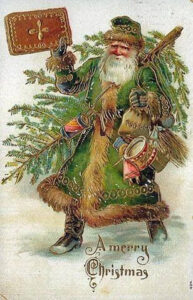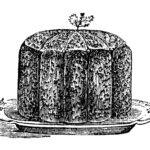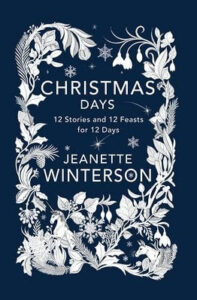Christmastide
It’s time for tales, presided over by the Lord of Misrule, who must be the guardian spirit of creativity, as he is of the ancient twelve days of Christmastide.
–Jeanette Winterson, Christmas Days
Every December I write a short newsletter that hopefully brings something fresh to what is already, for many of us, a very significant time of year. This year I came across a gem of a book by English author Jeanette Winterson, first published in 2016, called Christmas Days: 12 Stories and 12 Feasts for 12 Days.
If you’re looking for something original to mix into your holiday reading tradition, this is the book for you.
 In addition to twelve original stories, there is a fabulous foreword called “Christmas-tide” in which Winterson provides an illuminating jaunt through the international history of Christmas—from the Roman Saturnalia, to Twelfth Night, to how the green robe of the Dutch Sinta Klaus became the red suit of New York’s St. Nicholas, thanks to Coca-Cola. She gives a fun synopsis of how we have arrived at the holiday we now call Christmas.
In addition to twelve original stories, there is a fabulous foreword called “Christmas-tide” in which Winterson provides an illuminating jaunt through the international history of Christmas—from the Roman Saturnalia, to Twelfth Night, to how the green robe of the Dutch Sinta Klaus became the red suit of New York’s St. Nicholas, thanks to Coca-Cola. She gives a fun synopsis of how we have arrived at the holiday we now call Christmas.
“Telling stories round the fire is as old as language. And, as fires are lit in wintertime, the winter festivals were natural story-telling opportunities.”
Winterson, as you may know from her novels, is a very inventive storyteller and with these holiday stories she shines. Each of the twelve tales is by turns touching, humorous, or fanciful, and there’s even a scary one in honor of the traditional Victorian Christmas Ghost Story. There is something unforgettable here for everyone.
Each story is also accompanied by a recipe—“twelve feasts for twelve days,” with a very personal, often moving or funny introduction by the author, including the sherry trifle she made for her father’s last Christmas.
“Ritual is a way of altering time. By which I mean a way of pausing the endless intrusions of busy life.”
Whatever our varied religious leanings and backgrounds, Winterson encourages us to create and participate joyfully in our own holiday rituals based on the universal and ancient celebrations of the turning of the year. What she calls “time cut out of time.” That is, to be taken out of linear, outward time by creating “significant imaginative time.”
I like Winterson’s use of the word “tide” instead of time because it evokes the cyclical and nonlinear aspects of water and the tides.
All of this to say, I wish for you to enjoy the great gift of time-out-of-time this Christmas as you revel in your holiday traditions.
Happy Reading & Merry Christmastide!





